As a real estate agent, you have a lot to juggle between clients, listings, networking, and bookkeeping. Inefficiency in these areas can hurt your business, especially regarding your books.
By implementing a robust bookkeeping system, you can take control of your financial health, make informed business decisions, and ensure compliance with tax laws and regulations. This is a powerful tool that can empower you to run your business more effectively and confidently.
Here, we will discuss the details of bookkeeping for real estate agents and the different accounting procedures, methods, and bookkeeping practices that work for them.
What is real estate bookkeeping?
The bookkeeping for real estate agents records and tracks all real estate transactions and property management transactions. They are used by real estate agency owners, property managers managing property for clients, housing association account holders, construction company managers, real estate entities, investment trust managers, and real estate service providers.
Why is real estate bookkeeping essential?
Without a proper accounting system and accurate reporting procedures, real estate agents could miss out on tax deductions, get in trouble with the law due to inaccurate financial reporting, lose track of your business’s economic health, and have financial difficulty. These are not just potential issues, but real risks that can significantly impact your business’s success and your personal financial stability.
The financial records of real estate agents are the backbone and framework of your real estate business. They give you a behind-the-scenes look at potential issues, known as ‘red flags ‘, business funds, and opportunities for business growth, such as identifying profitable properties or areas for expansion.
You need a bookkeeping system to run a successful real estate business.
How is real estate bookkeeping different from bookkeeping for other industries?
While bookkeeping involves accounting tasks such as recording income and business expenses and tracking assets and liabilities in all industries, some transactions are specific to real estate. Real estate brokers also have unique financial management needs that differ from those in other industries.
Some of these transactions include invoicing tenants for rent, which involves tracking each tenant’s due dates and amounts and receiving rent payments, which requires recording the date, amount, and payment method for each transaction.
Other unique transactions include charging late fees for unpaid or late rent payments, posting tenant security deposits, managing Homeowners’ Association fees, buying and selling processes, and tracking accrued depreciation on real estate property, each with specific recording and tracking requirements.
Why do real estate agents use cash-based accounting?
According to the IRS, most real estate professionals use the accounting structure of cash-basis accounting. This accounting method means income, such as rental income, is recorded when received, and expenses are deducted when paid. Income is taxable when payment is received, and expenses are deductible when paid, not when an invoice is received.
There are several advantages to the cash accounting method. One of them is that it’s easy to follow. It tracks the cash coming into the business and the cash going out. When tax time rolls around, you don’t have to pay tax on any money that hasn’t been received.
This simple method gives you an accurate picture of your “in-the-moment” cash flow. With cash-based accounting, you can feel relieved knowing you don't need to be a financial expert to manage your business's finances effectively.
The cash method also allows real estate agents to delay the closing date until after the first of the year but pay as many expenses as possible before the end of the year to minimize taxable income for the current year. Many real estate agents like cash accounting for the peace of mind it gives them come tax time.
Most real estate agents use cash-based accounting because of its simplicity and tax benefits.
How is a transaction posted?
When you post a transaction, you should include enough information to cross-reference and track through a paper trail in case of an audit.
For income, such as receiving rent from a tenant, you would have all the tenants’ names and addresses on file. The payment would be posted on the date the payment is received from the tenant, along with the amount received, payment method, payment period, and balance due.
For expenses, the payment will be posted on the date the payment was made, with the name & address of the vendor, amount of payment, payment method, payment period, and balance due, if any.
What are real estate financial reports, and how are they used?
Real estate accounting and financial reports show exactly where a real estate company stands financially. Bookkeeping transactions generate various real estate company financial reports, with all your financial data in one place. These reports include an income statement, cash flow report, balance sheet, capital expense statement, rent roll, and bank reconciliation.
These reports will show the financial health of businesses, real estate brokers, or property owners. They’re also a resource for potential investors who want to know a company’s financial history. Financial reports are one of the many tools available to real estate businesses.
What are the best real estate bookkeeping solutions?
Real estate professionals use three bookkeeping methods: manual spreadsheets, generic accounting software, and actual real estate team-specific software.
Some real estate business owners use manual spreadsheets from programs like Numbers, Excel, Google, and OpenOffice to track expenses and income. This is only practical if the business is small; keeping the information current can be time-consuming and laborious.
While generic accounting software is more efficient than manual spreadsheets, it is not designed for rental property. However, bookkeeping software like Shoeboxed and QuickBooks can be customized to meet the specific needs of real estate professionals. Whether you are a team of agents or an individual real estate agent, these programs will work for you.
Real estate bookkeeping software is designed for real estate professionals. It has features for invoicing tenants, receiving and posting rent payments, late fees, security deposits, HOA fees, property purchases and sales, and tracking depreciation.
Software like Shoeboxed automatically tracks expenses with features that categorize charges specific to real estate businesses.
With real estate bookkeeping-specific software, real estate agents can have their own real estate accounting system and track almost everything they need in one place. There are many bookkeeping software options for agents to choose from.
How can real estate agents simplify their bookkeeping process?
Real estate agents can simplify bookkeeping using an app or outsource receipt and document management.
Shoeboxed
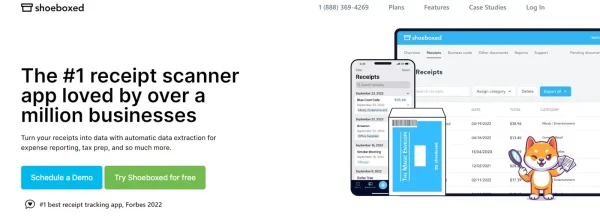
Shoeboxed is a game changer for bookkeeping.
Shoeboxed has been voted the best receipt scanner app for tax season by Hubspot, Trusted Vendor, and Quality Choice by Crozdesk.
Digitizes receipts and documents
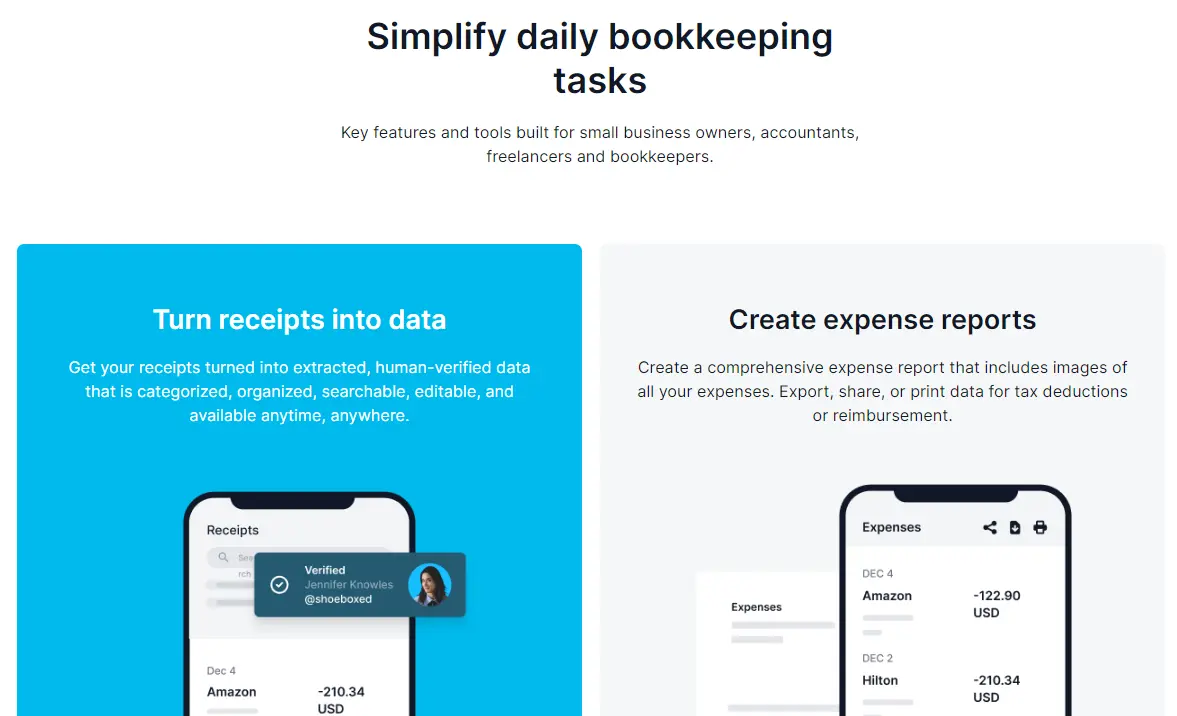
Real estate agents have many receipts and documents.
Digitizing receipts and documents reduces paper clutter and manual entry and makes the documents much more accessible.
Shoeboxed extracts critical information from receipts; no more manual data entry.
Stop doing manual data entry 🛑
Outsource receipt scanning to Shoeboxed’s scanning service and free up your time for good. Try free for 30 days!✨
Get Started TodayMobile app
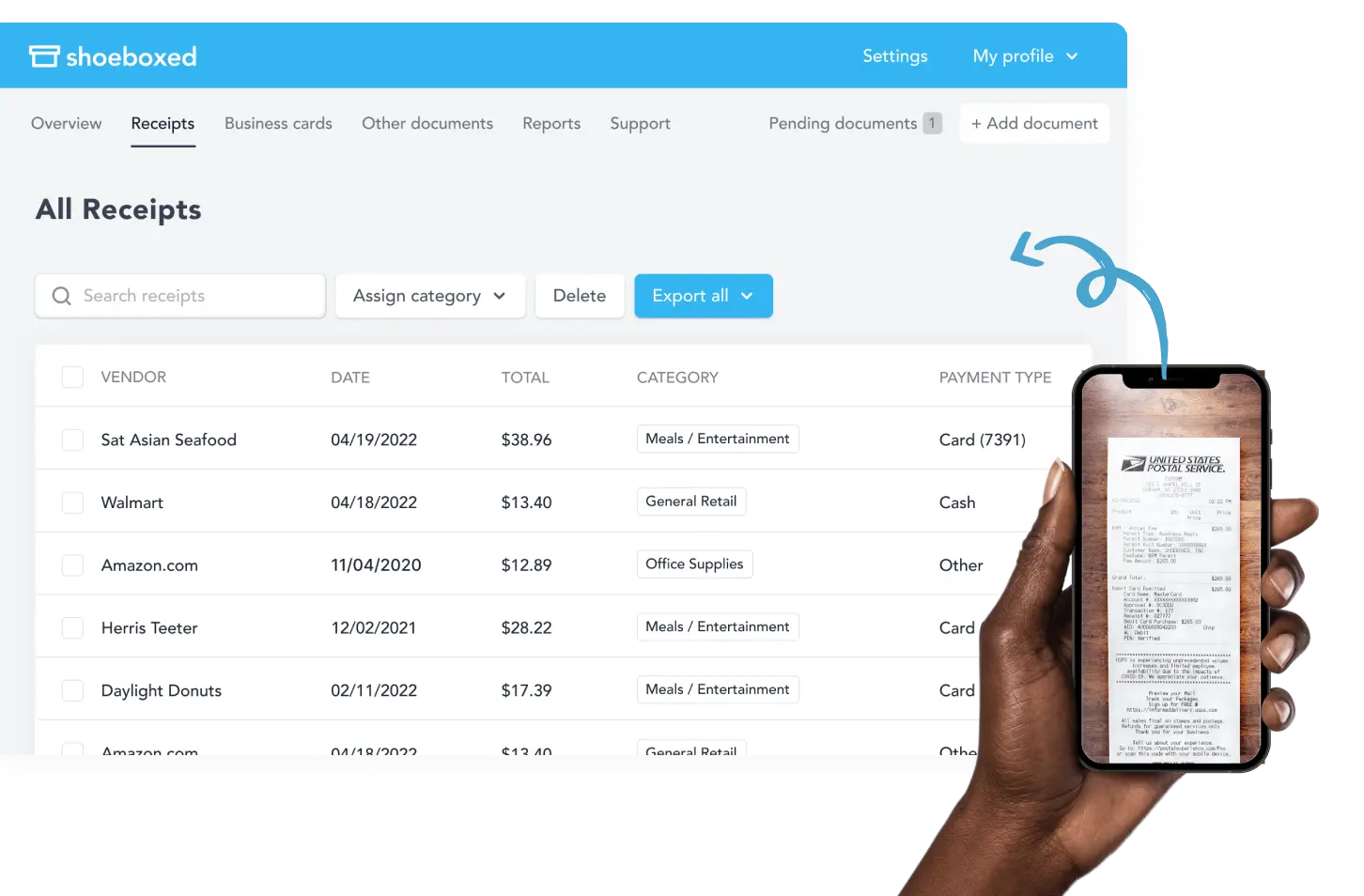
As more real estate professionals operate in a mobile format, real estate agents can take photos of receipts using their mobile devices and Shoeboxed’s app to upload receipts and documents to your Shoeboxed account.
Shoeboxed is a cloud-based storage system. All receipts and documents are stored in the cloud, so you can access them anywhere and never lose necessary paperwork.
The digitized receipts and documents are easily searchable, so you can find any real estate data in seconds.
Magic Envelope

If you want to outsource receipt and document management, Shoeboxed offers a free postage-paid Magic Envelope you can fill with receipts and mail to their processing center to scan, human-verify, and upload into your account.
Real estate agents can send batches of receipts in a pre-paid Shoeboxed envelope for scanning and digitization, saving time in processing.
Shoeboxed is the only receipt scanner app that will handle both paper and digital receipts, saving customers up to 9.2 hours per week from manual data entry!
Break free from manual data entry ✨
Use Shoeboxed’s Magic Envelope to ship off your receipts and get them back as scanned data in a private, secure cloud-based account. 📁 Try free for 30 days!
Get Started TodayOrganizes and categorizes
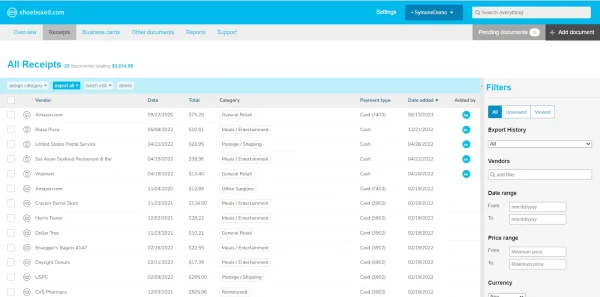
Once uploaded, Shoeboxed categorizes and organizes the scanned receipts.
Shoeboxed categorizes expenses into tax or custom categories, such as marketing, transportation, office supplies, and more, so agents can track their spending.
Expenses are categorized so agents can track client-specific costs and profitability.
Real estate agents can create custom tags and categories to suit their bookkeeping and real estate accounting needs and have even more financial control.
This auto-categorization saves real estate agents time and reduces errors.
Turn receipts into data with Shoeboxed ✨
Try a systematic approach to receipt categories for tax time. Try free for 30 days!
Get Started TodayGenerates expense reports
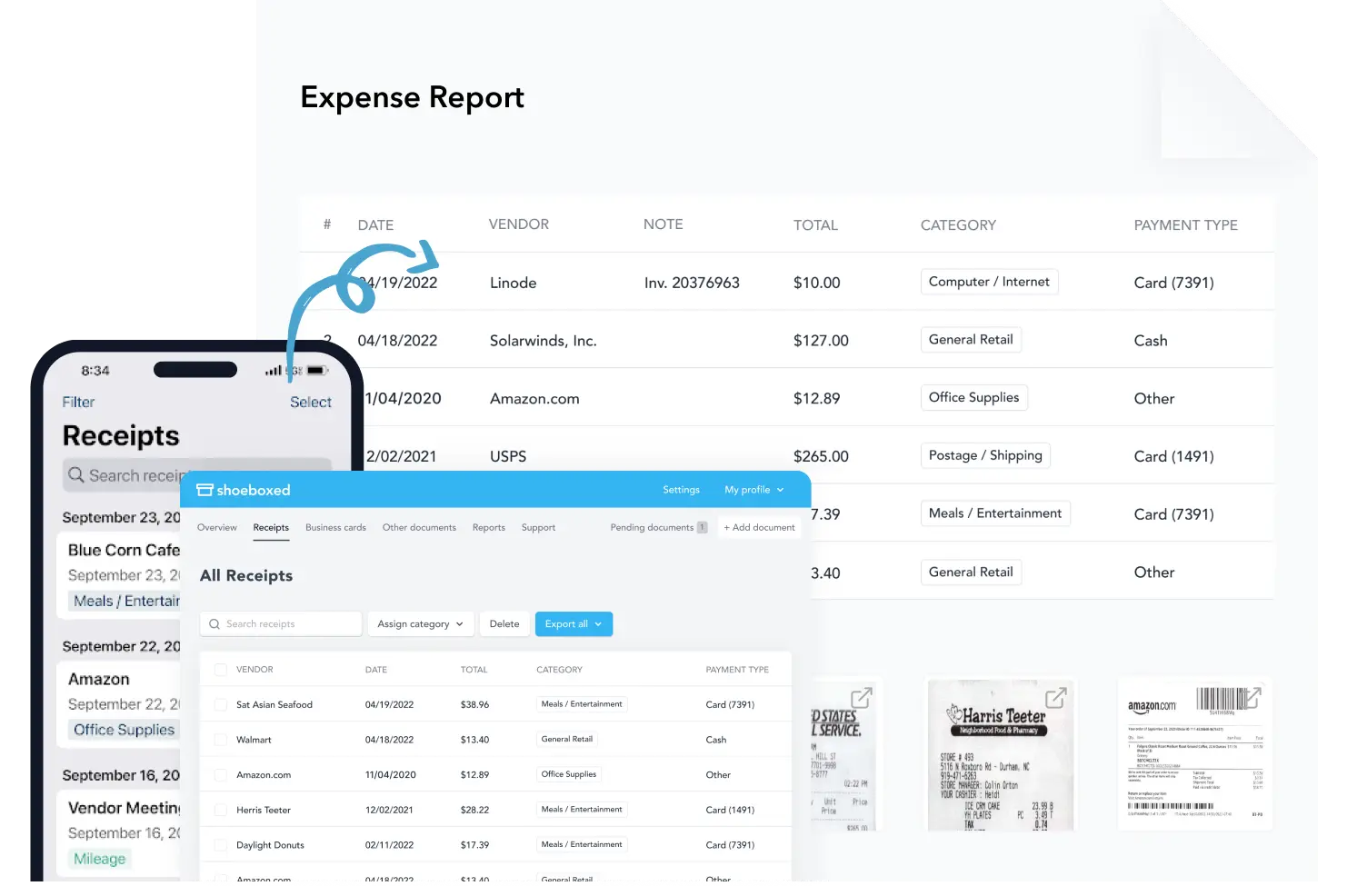
Shoeboxed generates detailed reports for reimbursements, expense reports, and tax deductions with just one click.
Detailed expense reports show spending patterns and financial accounts and help real estate agents with budgeting and financial planning.
Integrates with accounting software

Another great feature for real estate agents is its seamless integration with accounting software like QuickBooks and Xero for easy data transfer and sync.
IRS-accepted
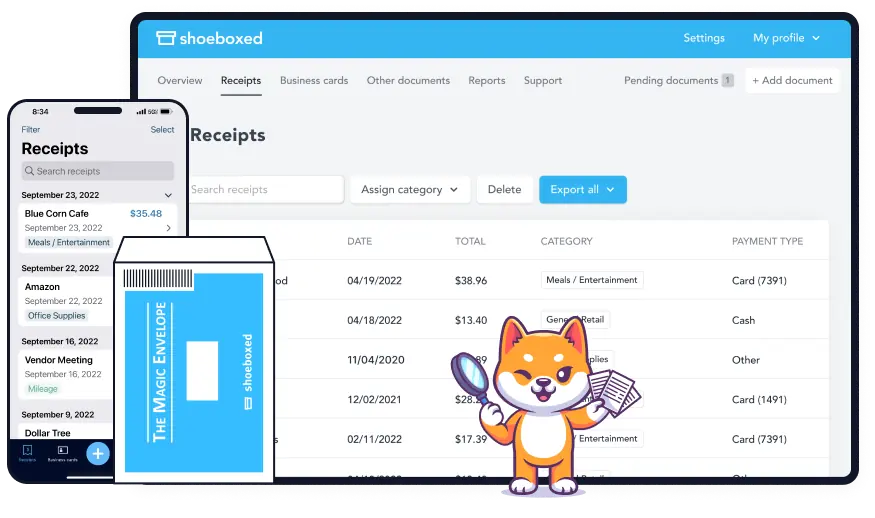
With Shoeboxed, receipts are stored in an IRS-accepted format, making tax preparation smoother and more audit-proof.
Shoeboxed tracks deductible expenses like mileage, office supplies, etc., so you can maximize tax deductions.
It generates tax-friendly reports of deductible expenses to make tax filing accurate and easy.
Mileage tracking
Shoeboxed has a mileage tracking feature that logs business trips. This is helpful for real estate agents who travel for property showings and client meetings.
Detailed mileage reports can be generated to track and claim mileage deductions.
Collaboration
Multiple team members or assistants can access Shoeboxed so you can collaborate on bookkeeping tasks.
Different levels of access and permissions can be set for personal accounts and other users to protect financial data.
Shoeboxed can help real estate agents simplify bookkeeping, save time, track accurately, and focus on what they do best—assisting clients in buying and selling.
By leveraging these features, Shoeboxed can help real estate agents streamline their bookkeeping processes, save time, ensure accurate financial tracking, and ultimately focus more on their core business activities of helping their clients buy and sell properties.
Shoeboxed demo
What are the common bookkeeping mistakes in real estate?
Common bookkeeping mistakes in the real estate market can cause financial and operational problems.
Here are mistakes that we have found to be the most common:
1. Poor record keeping
Not keeping detailed records of all transactions, including small expenses, can lead to errors.
Not storing receipts properly can lead to missing documents for expenses, and not having backups for financial records can result in data loss in case of system failure.
2. Personal expenses and business finances mixed
Using the same account for personal and business transactions for your real estate business can make bookkeeping and tax preparation harder.
Separating personal and business expenses can lead to more accurate financial reporting.
3. Incorrect categorization
Misclassifying income and expenses can skew financial reports and tax filings.
Not categorizing deductible expenses properly can result in missed tax deductions.
4. Inconsistent income tracking
Not recording all sources of income like rental income, commissions, or referral fees.
Recording income late can cause financial statement discrepancies.
5. No reconciliation
Not reconciling bank statements with bookkeeping records can cause errors and discrepancies to go unnoticed.
Not reconciling credit card statements can result in missed payments or unrecorded expenses.
6. No cash flow management
Not tracking the incoming and outgoing transactions can cause problems, including the inability to pay bills and manage day-to-day operations.
Not projecting cash flow needs accurately can cause financial stress.
7. Inadequate expense documentation
Not keeping receipts for all business expenses can cause problems during audit and tax time.
Not providing clear descriptions of expenses can make them hard to justify as business-related.
8. Not following tax rules
Tax filing errors like incorrect deductions or missed deadlines can result in penalties and interest.
Not reporting all income sources can result in legal issues and fines.
9. No regular financial checkups
Not reviewing financial statements can cause undetected errors and a lack of understanding of the business’s financial health.
Overlooking financial reports and metrics can result in missed financial improvement opportunities.
10. Not using technology
Using old or wrong bookkeeping software can cause inefficiencies and errors.
Relying too much on manual processes instead of using automation tools like Shoeboxed can increase the risk of human error.
11. No mileage tracking
Not tracking mileage for business-related travel can result in missed deductions and incorrect expense reports.
12. Overlooked accounts payable and receivable
Not paying vendors on time can hurt relationships and incur late fees.
Not following up on overdue receivables can cause cash flow problems.
Real estate and financial professionals can have accurate and efficient bookkeeping and better financial management and decision-making by understanding these common mistakes and following best practices.
Frequently asked questions
Why do real estate investors need to implement a bookkeeping process?
It's essential for real estate professionals to implement bookkeeping for these main reasons:
1. Financial management
Cash flow: Bookkeeping helps investors track cash flow to pay bills and find profitable properties.
Expenses: Bookkeeping lets investors categorize and manage expenses to control costs and maximize returns.
2. Tax compliance and optimization
Accurate tax returns: Good bookkeeping makes sure all income and expenses are recorded so tax returns are accurate and you don’t get audited.
Maximize deductions: Knowing bookkeeping helps investors find and claim all the tax deductions they can – mortgage interest, property taxes, depreciation – so they pay less tax.
3. Better decision making
Financial statements: Up-to-date financial statements give investors insight into their investments, allowing them to decide whether to buy, hold, or sell properties.
Investment analysis: Bookkeeping data lets investors analyze individual property performance and make data-driven decisions on their real estate portfolio.
4. Budgeting and forecasting
Budgeting: Bookkeeping helps investors create budgets for property maintenance, improvements, and other expenses to allocate funds correctly.
Forecasting: With accurate financial records, investors can forecast future expenses and income to plan for long-term growth and stability.
5. Regulation
Regulatory compliance: Real estate investors must comply with many financial regulations and reporting requirements. Bookkeeping ensures they comply with these rules and don’t get in trouble or fined.
Audit readiness: Accurate and organized records make responding to audits and inquiries from tax authorities or lenders easier.
6. Loans and financing
Loan approval: Lenders require detailed financial records to approve loans. Good bookkeeping provides the documentation to support loan applications and show creditworthiness.
Interest rate negotiation: Accurate financial statements can help investors negotiate better terms and interest rates for financing by showing their financial stability.
7. Risk Management
Financial issues: Bookkeeping helps investors spot financial issues early—cash flow problems or rising expenses—so they can act quickly.
Fraud prevention: Accurate records help detect and prevent fraud so investors protect their assets.
8. Operational efficiency
Property management: Bookkeeping lets investors track property management expenses, tenant payments and maintenance costs so they can manage properties more efficiently.
Tenant relations: Accurate records of rent payments and expenses help in managing tenant relations so they are transparent and conflict-free.
9. Growth and Scaling
Growing business: As investors add more properties, bookkeeping becomes essential to managing multiple income streams and expenses so they can grow and expand.
Attracting investors: Detailed and accurate financial records can attract investors or partners by showing the profitability and stability of the real estate portfolio.
10. Personal financial health
Separating finances: Bookkeeping helps investors separate their personal and business finances so they can have clear financial boundaries and personal financial control.
Real estate professionals need to understand bookkeeping to manage property effectively, comply with tax and regulations, make better decisions, and ensure their real estate business's long-term success and profitability.
What’s the benefit of a real estate bookkeeping system?
A bookkeeping system improves cash flow by tracking all the transactions in and out of the business. It shows you how to increase revenue and reduce expenses. Bookkeeping also creates documentation, financial documents, and a paper trail in case the company is audited.
In conclusion
Real estate professionals should have a professional accountant and bookkeeping system. The right system for your business will show you where and how to increase income and maximize profits. Bookkeeping breaks down every expense so you can see where to save and grow.
However, you must be aware of common bookkeeping mistakes in the real estate industry, such as not reconciling your bank accounts and statements or not tracking all expenses. By avoiding these mistakes, you can ensure your real estate professional bookkeeping system is accurate and efficient.
A bookkeeping system will also have an updated balance sheet with owner’s equity calculated so you can see opportunities for property appreciation. This appreciation can be used as a down payment for another rental property. So, the best real estate bookkeeping system will show all the red flags and all the growth opportunities.
Caryl Ramsey has years of experience assisting in bookkeeping, taxes, and customer service. She uses various accounting software to set up client information, reconcile business accounts, code expenses, run financial reports, and prepare tax returns. She is also experienced in setting up corporations with the State Corporation Commission and the IRS.
About Shoeboxed!
Shoeboxed is a receipt scanning service with receipt management software that supports multiple receipt capture methods: send, scan, upload, forward, and more!
You can stuff your receipts into one of our Magic Envelopes (prepaid postage within the US). Use our receipt tracker + receipt scanner app (iPhone, iPad, and Android) to snap a picture while on the go—auto-import receipts from Gmail. Or forward a receipt to your designated Shoeboxed email address.
Turn your receipts into data and deductibles with our expense reports, including IRS-accepted receipt images.
Join over 1 million businesses scanning & organizing receipts, creating expense reports, and more—with Shoeboxed.
Try Shoeboxed today!



